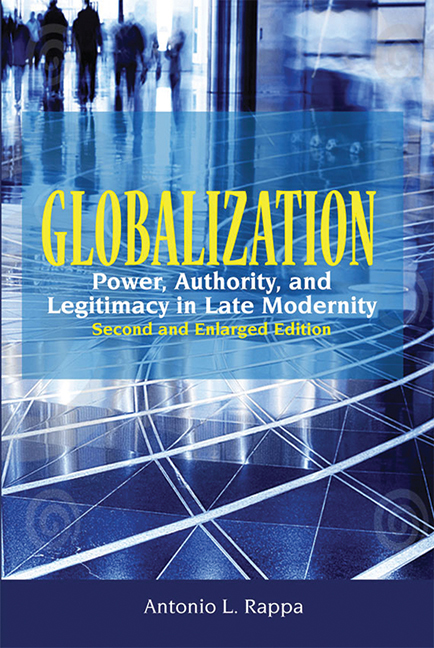Summary
Is culture “political”? An element of the reason why it is not considered political is because it does not seem to be the “stuff ” of high politics. The kind of culture that we refer to in this chapter is different from the kind of culture that is referred to in the book as a whole. In this chapter, the focus is on the kind of culture that has emerged in late modernity. The name of that culture is popular culture. The kind of popular culture in globalization that has had the greatest impact in late modernity is American popular culture.
Enter Culture
Unlike Alvin Gouldner's lilting remonstrance titled Enter Plato, the cultural considerations of power, authority, and legitimacy in late modernity are not quite as reassuring. Late moderns must learn to accept popular culture whether they like it or not. There is no real choice. It slowly creeps up on you. The influence is subtle and overt, noisy and quiet, hard and fast, soft and slow, entering and exiting as we pass time towards the kind of nihilism that Jean Paul Baudrillard experiments with in the last chapter of Simulacra et Simulacrum. We consider and question the sacred cows of modernity's popular fictives and their illusory and captivating devices that project us backwards into the immediacy of existence. Autonomously, these become canons of combat, created to fill spaces of modernity's boredom and languish within late capitalist consumption behavioural patterns that clog up the streets in Greenwich Village. Let us consider some of the more favourite canons of popular culture the world over: (1) Popular culture works because of peer pressure; (2) popular culture is promoted through mass mediated advertising and marketing; and (3) popular culture is about creating instantaneous cultural icons of television, movies, drama, sports, war, philosophy, and science. Examples of cult figures or personality cults in popular culture over the years include Simone De Beauvoir, Hannah Arendt, and Judith Butler (American feminism), Henry Miller (forbidden novels), Toshiro Mifune (Japanese Samurai monochromatic television), John Travolta (American disco), Alec Guinness (British drama), Mika Hakkinen (Formula One sports), Carl Von Clausewitz (war), Michel Foucault and postmodernism (philosophy), Stephen Hawking (physics), Josef Stalin and Mao Tse-tung (communism), Antonio Gramsci (Italian neoMarxism), Eleanor Roosevelt (American icon), Il Duce (Italian Fascism), Martin Luther King, Jr. (American icon), John F. Kennedy (American liberalism), and Fidel Castro (Cuban socialism).
- Type
- Chapter
- Information
- GlobalizationPower, Authority, and Legitimacy in Late Modernity (Second and Enlarged Edition), pp. 187 - 217Publisher: ISEAS–Yusof Ishak InstitutePrint publication year: 2011

